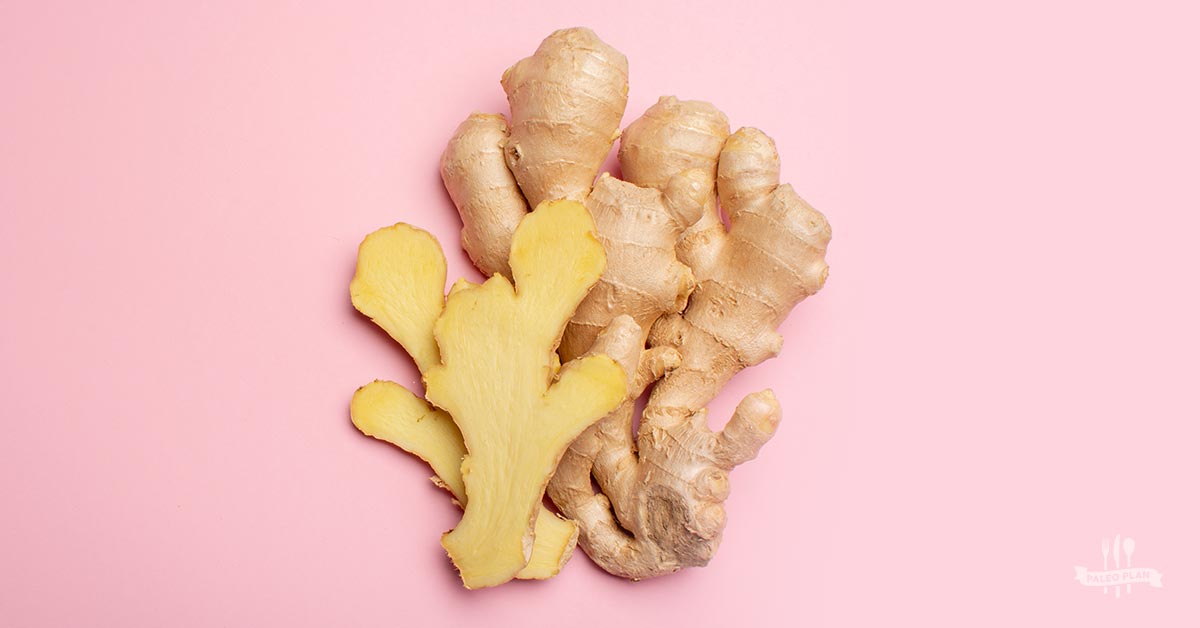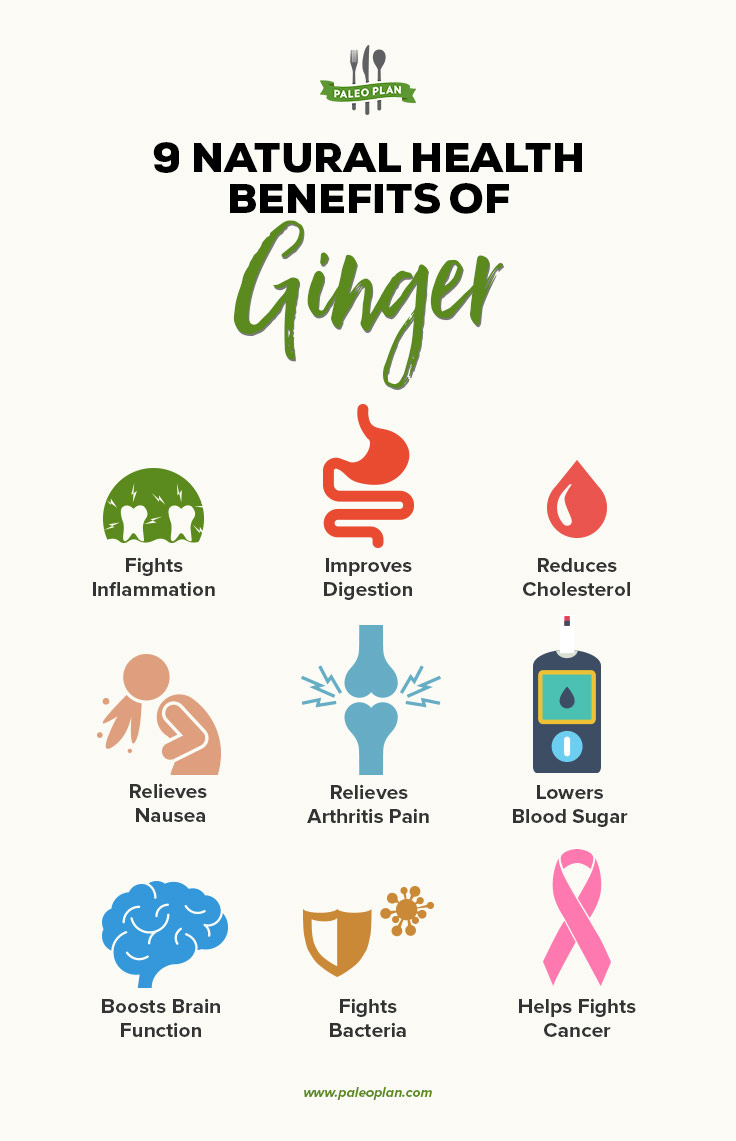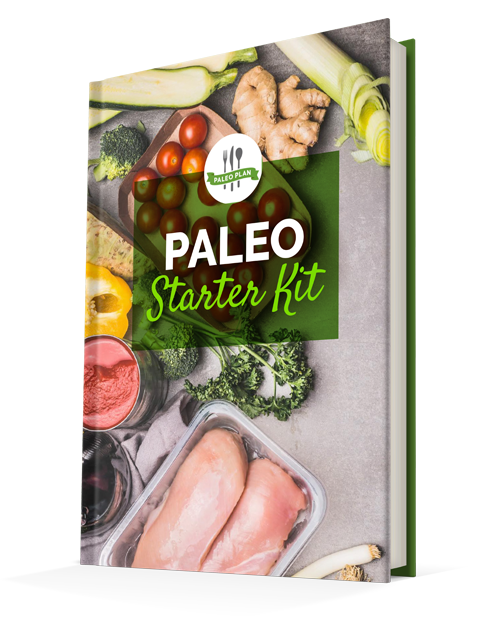
Ginger has been hailed by the health community for decades as a superfood with countless healing benefits. But just how beneficial is this knobby root? The researched-backed answers will surprise you.
Ginger: The 5,000 Year-Old Super Root
Ginger root is a rhizome that grows from a plant in the same family as cardamom and turmeric. It contains several substances, including gingerols and oleoresin. These not only give it its spicy “bite”, but also an abundance of medicinal properties.
While it remains one of the most popular supplements consumed today, ginger’s actual origin is still unknown. It’s believed to have been used as a tonic in China as far back as 5,000 years ago. Researchers also found it recorded in several ancient Sanskrit texts, referred to as srngaveram, or “horn root”.
Ginger was traded as far back as 2,000 years ago between India and the Roman Empire, and remained highly sought after across Europe for centuries. Of course, this demand came with a price: by the thirteenth century, a pound of ginger was equal to the cost of a sheep.
Some of this demand was for the flavor ginger adds to dishes and sweets (a slightly peppery, spicy, sweet taste), but mostly it was desired it for its health benefits. Ancient medicine systems like Ayurveda and Traditional Chinese Medicine have used ginger to cure everything from nausea and inflammation to arthritis and even cancer. (1)
Now, ginger is valued for almost all the same health benefits, with modern research and studies backing the claims. Let’s dive in to see nine healing properties of this mighty root.
Nutritional Benefits of Ginger

Ginger contains several potent compounds (researchers estimate at least 115 constituents) responsible for its bioactive and medicinal properties. The most important and abundant of these are gingerols and shogaols, which have strong anti-inflammatory and antioxidant properties.
100 grams or 33.5 ounces of raw ginger also contains (2):
– 415 milligrams potassium (12 percent DV)
– 0.2 milligrams copper (11 percent DV)
– 0.2 milligrams manganese (11 percent DV)
– 43 milligrams magnesium (11 percent DV)
– 5 milligrams vitamin C (8 percent DV)
– 0.2 milligrams vitamin B6 (8 percent DV)
– 0.7 milligrams niacin (4 percent DV)
– 34 milligrams phosphorus (3 percent DV)
– 0.6 milligrams iron (3 percent DV)
9 Natural Health Benefits of Ginger

1. Ginger Fights Inflammation
One of the most well-known benefits of ginger is its ability to fight chronic inflammation. Long-term inflammation is believed to contribute to many diseases, including obesity, diabetes, and even cancer.
Ginger’s active compounds, namely gingerol and shogaol, help reduce chronic inflammation to help ease pain and lower your risk of developing diseases associated with inflammation. (3)
2. Ginger Improves Digestion
Throughout history, ginger received much of its fame for its ability to improve digestive disorders ranging from constipation to bloating and gas. Studies confirmed that most of the compounds in ginger are absorbed straight through your digestive tract, where they have an immediate effect on your gut health.
One study showed ginger was able to increase the rate of stomach emptying by up to 25 percent in people with indigestion. (4) Stomach emptying is important in order to avoid having food sit and ferment in your digestive tract, which can lead to gas, heartburn, and bloating.
3. Reduces Cholesterol
While small amounts of cholesterol are needed to support hormone levels, an excess can lead to heart and circulation problems.
Ginger is able to naturally lower cholesterol levels by reducing bad LDL cholesterol and raising beneficial HDL cholesterol. (5) In fact, one animal study even showed that ginger was able to lower cholesterol levels almost as effectively as the cholesterol-lowering prescription atorvastatin. (6)
4. Ginger Relieves Nausea

Ginger is one of the best natural remedies to treat nausea from many causes, including morning sickness and seasickness.
Research shows that in pregnant women, ginger is able to reduce nausea without any side effects. Other studies show it’s also strong enough to reduce the severity of nausea in chemotherapy patients. (7, 8)
5. Ginger Relieves Arthritis Pain
Osteoarthritis is another disease rooted in chronic inflammation. As you know, ginger contains potent anti-inflammatory compounds that help reduce widespread inflammation throughout your body.
Studies show that people with osteoarthritis of the knee who took ginger extract had less pain and required less medication than those using a placebo. (9)
6. Ginger Lowers Blood Sugar
Interestingly, ginger also has blood-sugar lowering and anti-diabetic effects. Studies show that consuming ginger results in better glucose tolerance and insulin levels, as well as significant reductions in body weight and hyperglycemia (high blood sugar). Researchers believe ginger has this effect by enhancing insulin sensitivity and improving glucose uptake by activating certain beneficial enzymes. (10)
7. Ginger Boosts Brain Function

Ginger leaves no stone unturned when it comes to body benefits, and this includes your brain. Research has shown that ginger helps protect against cognitive decline and brain aging, as well as improve diseases like dementia and Alzheimer’s. (11, 12) Scientists believe ginger benefits the brain by helping to reduce inflammation and oxidative damage, or damage caused by stress, a bad diet, and environmental pollution.
8. Ginger Fights Bacteria
Ginger is also considered an antifungal and antibacterial; multiple studies shows ginger inhibits the growth of several strains of each. (13) One study in particular showed ginger was effective even against multi-drug resistant bacteria. (14)
9. Ginger Helps Fights Cancer
Ginger is widely studied for its ability to fight many forms of cancer, including hepatoma, lymphoma, colorectal cancer, breast cancer, liver cancer, skin cancer and bladder cancer. Research shows that multiple compounds, including gingerol, are able to induce cancer cell death, suppress proteins that activate tumor growth, and stop the spread of cancer cells. (15)
In addition, ginger contains many antioxidant compounds that help neutralize the free radicals that cause damage to your DNA and result in cell mutations that could trigger cancer growth. (16) This makes it not only a potential cancer treatment, but also a potential preventative.
Risks and Side Effects of Ginger
Rarely have there been any extreme side effects of eating or taking ginger. In general, the most common symptoms include mild abdominal discomfort, heartburn, diarrhea, and gas.
Some experts recommend that people with gallstone disease use caution with ginger because it may increase the flow of bile. Others caution that it might interact with anticoagulants (blood thinners), although research does not support this claim.
As for pregnant women, several studies have found no evidence of harm from taking ginger during pregnancy. However, if you plan on taking it while pregnant, be sure to check with your healthcare provider first. (17)
How to Use and Store Ginger

When you’re looking to purchase fresh ginger root, look for a root whose skin is thin and taut (not fibrous) and doesn’t contain any bruises or soft spots. Also, make sure it smells pungent and spicy.
To store ginger, place it in a sealed container in your fridge, where it should last for a little over a week.
Easy Ways to Use Ginger
- Add a 1-inch slice of ginger to water and simmer for 10 minutes. Strain, then add 1 teaspoon of honey and enjoy.
- Blend ginger into smoothies for a spicy-sweet kick.
- Add grated ginger to soups and stews.
Delicious Ginger Recipes
1. Ginger, Carrot, and Sweet Potato Soup
2. Ginger Turmeric Smoothie
3. Slow Cooker Curried Chicken and Butternut Squash
4. Ginger Beef and Noodle Stir-Fry
5. Almond Ginger Garlic Dressing
6. Paleo Pumpkin Spice Latte
7. Cauliflower Fried Rice
8. Garlic Ginger Paleo Marinade
9. Ginger Brownies
10. Ginger and Garlic Pork Tenderloin with Cauliflower Rice
11. Paleo Thai Marinade

(Read This Next: 9 Health Benefits of Cinnamon and Which Type is The Best)
